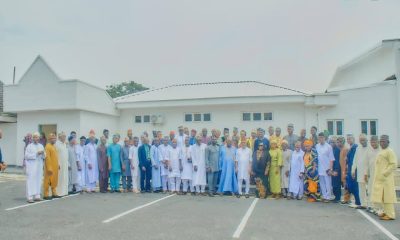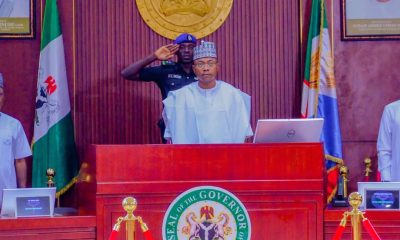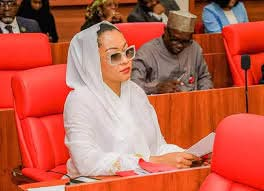Opinion
An Open Letter To Gov. Ahmed Usman Ododo of Kogi State on the Needless, Avoidable Crisis Concerning Senator Natasha Akpoti Uduaghan’s Recall

By Prince Bolarin Friday Ogungbemi
Dear His Excellency, Alhaji Ahmed Usman Ododo, I greet you and I say well done sir.
I feel highly obligated to write this open letter to warmly address you as a brother and leader whom I cherish. Your Excellency, your one year in office has been one of the most peaceful time in the Kogi State in recent past, no labour crisis, no political crisis and our people could go to bed without much fears in their hearts. We give kudos to your style and pattern of administration these are resounding successes sir.
I am not unaware of the enormous demands of your office but as a concerned citizen, I feel like sharing my thoughts and reasoning with you knowingly that the task of governing people entails a lot of intricacies that cannot be imagined sometimes, the assignment of piloting the affairs of the state.
The people of the State are wonderful people to have entrusted you with their socio-economic cum political fate.
Your Excellency, your initial steps and actions so far taken have endeared you to the people of the state. Don’t lose focus, but be prepared, be determined, be resolute, be honest and please try to jettison solidarity campaigners who are after money or other largesse and are greed.
My dear brother and friend, God has given you a golden opportunity to distinguish yourself and write your name in gold on the sand of time.
Your Excellency, I join your numerous supporters, admirers who collectively and individually put in their best to ensure you succeed, I urge you not to lose focus sir.
Your Excellency, you are widely acknowledged as an amiable and kind-hearted personality who is determined to change the narrative of the state positively.
Your emergence as governor in January, 2024 was divinely ordained by God perhaps to come and right the wrongs of the past and correct the mistakes of previous administrations.
I pray for you that may God give you the grace, the heart, the courage and the opportunity to fix Kogi State in no distant time.
Suffice to say, expectations are very high today, hope are rising, and tension induced as there is a ray of light of hope showing over the state.
My leader, you are a man of history and destiny, I crave your indulgence not to change your current policy on the timely payment of salary to all sectors in the state as you are currently setting a record now that may be very difficult to beat in the nearest future.
Your Excellency, my main point of discussion in this letter is the issue of Senator Natasha Akpoti Uduaghan’s attempt recall exercise, I want to advise that it would have been an unnecessary and avoidable challenges and a burden to your administration as your government and the people from the Kogi Central Senatorial District where incidentally you are from are not having any issues against her. I, therefore view it as a needless effort to begin to think of recalling her from the Senate today sir.
The republican nature of the Kogi State people is not just what anybody will ignore just like that, the large number of unheard voices will stand up against your position without minding the consequences of their actions.
I therefore urge you not to go into any contest to test your popularity now against Senator Natasha Akpoti Uduaghan, the people from Kogi Central may do otherwise to your disadvantage should the recall exercise continued, which can eventually provoke the other side of you as a human being, sir this is needless and avoidable.
First and foremost, is Senator Natasha Akpoti Uduaghan having any issues against your government or your person? Secondly, has she been hard on your government, I mean critical of your administration policies and programmes?
Thirdly, is she having a very friendly posture towards your person and affairs?
Your Excellency, the provisions in the Constitution and in INEC regulations and guidelines for recall exercise is so cumbersome to accomplish for recall exercise, therefore, I am using this opportunity to appeal you to never to get involved in such an exercise.
Your Excellency, I personally would encourage you to continually to build on the goodwill you are already having with the people so that it gets strong and stronger by the day sir.
My Governor, leadership is the ability to influence people towards the accomplishment of goals.
His Excellency sir, a school of thought opines that leadership is everyone’s business, it is an issue that affects all of us. Not only are we affected by it, but also we are all called upon to exercise it. Whether we are involved in leading in government or business, guiding young minds, leading a family, we must standup for what is right at all times. Everyone has a leadership role to play, as we are each entrusted into many different leadership roles time and again throughout our lives.
We are each called upon to be custodians of what is right and good; for things lasting and of value for those in our care. This is because a true leader does not tamper with individual freedom, choice, accountability and responsibility.
My brother, as an ideal leader, you must practice self-restraint, develop character, integrate discipline and practice love and respect for other people. This will promote self-leadership at all levels of the society. This will equally enhance -leadership environment where all are empowered and working towards the good of the whole, because it is in the best interest of all.
My dear governor, there is no doubt about it that you will made your marks in the sand of time, the journey has just started, you will serve the people well enough to some reasonable extent and by your human capacity. I implore you to still improve on your performance for prosperity’s sake.
Your Excellency, I make bold to say that I have friends in your administration who I have a lot of respect for and I equally admire them and in their interests I will do their biddings in your interests.
Few among them is the Deputy Governor His Excellency Comrade Joel Oyibo Salifu, Comrade Onuh Edoka, the Special Adviser on Labour Matters, Comrade Dr. Ojo Ranti, the Permanent Secretary of the Ministry of Culture and Tourism, my brother Comrade Tade Adeyemi the former NULGE President and even the current NULGE President Comrade Sanusi Salawu Inyanya who are all your great lovers and supporters. Therefore your success becomes paramount to me.
Your Excellency, it will be a disservice to you and your administration if I do not bring this to your notice. Your administration does not have a good working relationship with Media Practitioners in Kogi State.
Fourteen months into your administration’s forty-eight months first tenure, you are yet to meet the media professionals covering the state for a chat or personal interaction as was the tradition with previous administrations.
The interaction with journalists in Kogi State guarantees and enables you to feel the pulse of the polity as feedback for the policies and programmes of your administration while at the same time providing you insights into the popularity of your leadership’s effort to develop the state distinctively.
For the records Sir, the Special Adviser on Media Mr. Ismaila Isah has been very fair and friendly and forthcoming in bridging communication gaps between the government and the Media and in most cases, pleading for understanding among media practitioners in the state for obvious and perceived inadequacies.
The former Media Consultant under your predecessor, Former Governor Yahaya Adoza Bello’s administration, Dr (Mrs) Yemi Kolapo played a great role in resuscitating the once cold relationship and normalcy was restored but in the last five months, there’s been a relapse to morbid state.
Your Excellency, efforts will be made by these fair-weather friends to polarize your leadership and to create schism among your group and lieutenants in the state. They should ordinarily help to reconcile people with your esteemed self. But because of their selfishness and self centeredness they will not want you to be reconciled with those known leaders in the State.
My dear brother and leader, as the governor of the state you must begin to re-design the objectives of your administration to make more friends.
Your Excellency, your success is our pride. Please always think about when you will be out of office at the expiration of your tenure in office in 2028 or in 2032 as the case may be, how many of them will be with you thereafter?
Oliver Wendell Holmes once said that, “there are three types of people: the people who make things happen, the people who watch what’s happening and the people who haven’t the slightest idea of what’s happening.
The state has never before, been in dire or pressing need for good leadership than now. God has brought you out to rewrite the history of Kogi State for good.
Your Excellency, leadership is not obtained just for position sake, or for money or authority alone but from what you provide for the people. It is what we call or ascribe as leadership, this occurs when people decide for themselves that they are going to follow the direction, the guidance and the vision of someone’s else, they emulate, admire and think about. Do not let the sycophants to deter you of your earlier vision and mission for the state.
Your Excellency, governance is a serious business and only the serious minded ones should venture near it.
God does not impose responsibility without granting commensurate wherewithal to discharge it.
To my compatriots, we all therefore must not cease in praying for God’s guidance and direction so that you will not trample your feet against the numerous stones or traps the enemies have strewn on your pathway.
Before I conclude, my dear leader, I think you should see this opportunity as a chance to right the wrongs of the past not by marginalizing others or groups of people or ethnic groups but to do justice to all manners of people in the state.
The import of this write-up is to implore you to quickly intervene where it is necessary before it is too late. This masterpiece is put together in good fate.
Your Excellency, I wish to crave your indulgence to listen to the various voices of reasoning and jettison those with self-seeking interest and parochial thinking. Sir, I do not know if there will be another opportunity for me like this to have the luxury of time to once again write you so long a letter on this issue of good governance.
Finally, Your Excellency, we cannot but commend your wisdom and efforts in piloting Kogi State to the promised land, while we wish you a crisis free tenure ahead. We equally wish to encourage you to articulate the challenges and prospects of the state as an entity and constitute necessary committees to face those challenges headlong and to tackle them frantically when it is necessary. I use this medium to express my sincere appreciation for all the positive decisions thus far taken by your administration.
Governor Ahmed Usman Ododo sir, you are a man who has chosen the path of honour, a man of character, the hero of our time, I am proud of your personality and charisma, a kind hearted leader among leaders, wishing you more success in the onerous assignment that you have committed yourself to do.
To our compatriots – Kogites, I urge you all to support Governor Ahmed Usman Ododo, because he means well and he his doing well, I am also encouraging you the governor to continue this good work and become the pride of his generations.
Your Excellency Sir, wishing you success in your efforts to take Kogi State to higher heights.
Thanks for taking your time patiently to read through this lengthy letter, I wish that God should give you the special grace and enablement to be able to read between the lines and take the right steps.
My regards Sir.
Prince Bolarin Friday Ogungbemi
Publisher, The Policy & Lawmakers Magazine
08036797363, 08053125911
Opinion
Tinubu’s Dark Mercy: How Presidential Pardon Turned Justice Into A Joke
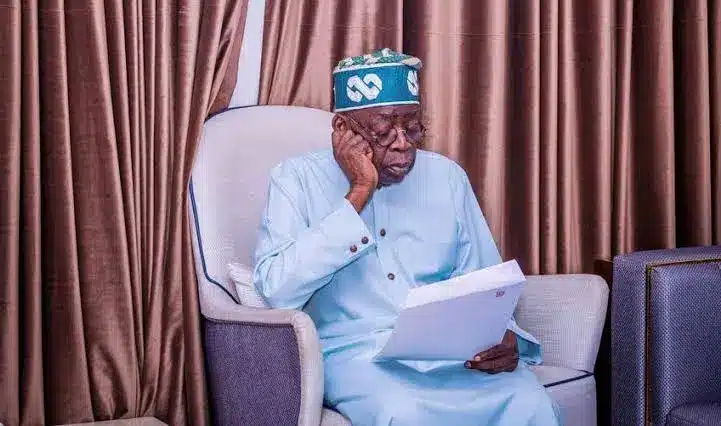
By Ademola Adekusibe
Something snapped in Nigeria yesterday. It wasn’t just the announcement that President Tinubu had pardoned 175 convicts; it was the final confirmation that in this country, crime no longer carries consequence. It was the state’s open confession that Nigeria’s justice system is now a casino, and those with connections always win.
Let’s start with one name that should haunt every soldier who ever wore the uniform: Major Suleiman Alabi Akubo. In 2008, a military court didn’t just find him guilty; it laid bare the horror of his betrayal. The man stole 7,000 weapons from the Nigerian Army, weapons meant for the nation’s defense, and sold them to militants who turned them on his own comrades. Soldiers died. Innocent Nigerians died. The country bled. And the General Court Martial, in its rare moment of courage, sentenced him to life imprisonment.
That was supposed to be justice. That was supposed to be a warning that no one, no matter how decorated, could betray the flag and walk free. But now, the same Nigeria whose sons were buried by bullets he sold has opened the prison gates and called it “presidential mercy.” Mercy for treason. Mercy for blood money. Mercy for a man whose greed armed killers and destabilized the nation.
If this is mercy, then what do we call justice?
And then there’s Maryam Sanda, a woman who, by her own actions, turned her matrimonial home into a slaughterhouse. The night she killed her husband wasn’t an accident; it was a progression of rage, five failed attempts before the fatal strike. The court found her guilty of culpable homicide and sentenced her to death by hanging. Nigerians thought it was closure. The law had spoken. But in this new Nigeria, even murder has an escape route, a back door guarded by sympathy, privilege, and presidential benevolence.
Today, she walks free. Her victim remains six feet below, voiceless, silenced forever. Is this how we honour the dead? By setting their killers free in the name of “mercy”? If Maryam Sanda deserves pardon, then what message are we sending to every man or woman enduring domestic violence? That if their abuser kills them, justice can later be undone with a signature?
And this isn’t even about two names. The rot runs deeper. Among those granted clemency were illegal miners, men who have turned parts of Zamfara and Niger State into killing fields. They were handed over to a politician, yes, a politician, as though the state were transferring cattle, not convicts. Do we even realize how insane that sounds?
Then there’s the drug traffickers, the billion-naira fraudsters, and bribe-takers like Farouk Lawan, once caught stuffing $500,000 into his agbada like a man packing sin into his conscience. They, too, found mercy. While ordinary Nigerians sit in jail for stealing yams, the powerful steal nations and go home with presidential blessings.
What sort of country pardons a man who sold weapons to militants but keeps forgotten prisoners locked up for years without trial? What manner of justice rewards murder with mercy but starves the poor of fairness? If clemency is now a luxury reserved for those whose crimes shook the nation, then we have entered the age of moral bankruptcy.
This isn’t compassion. It’s corrosion. It’s the state officially declaring that morality is negotiable, that you can destroy lives, arm terrorists, betray your country, and still find redemption as long as the corridors of power recognize your name.
And perhaps the cruelest part? The families of the victims, the widows, the orphans, the soldiers who died holding their rifles against bullets sold by Akubo, were not even consulted. Justice wasn’t just denied; it was mocked.
So yes, call it “Presidential Pardon” if you must, but let’s say what it truly is: a betrayal of every honest man who ever stood for something in this country. A message to every Nigerian that the law is not a moral compass, it’s a privilege card.
Tomorrow, when another officer sells arms to insurgents, when another wife kills her husband, when another politician embezzles billions, and we ask, “Why are people this reckless?” the answer will stare us in the face: because the system rewards the wicked and excuses evil when it’s done in expensive English.
This wasn’t mercy. This was moral suicide.
Credit: The Yoruba Times
Opinion
Nigeria @65: A Nation At a Crossroad Between Celebration, Reflection
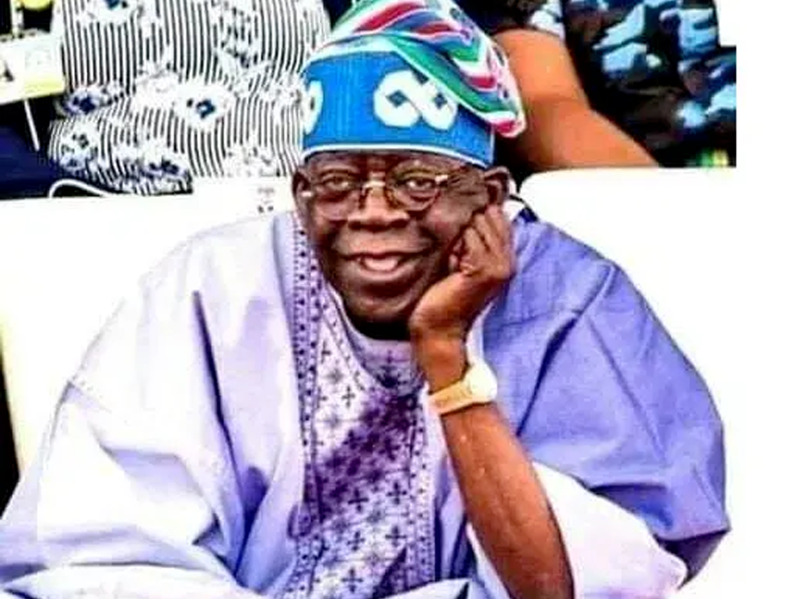
By Alao Adamadamosi Sunday, arpa
As Nigeria marks its 65th year of independence, citizens and leaders are grappling with a complex question: Is this an anniversary to celebrate, or a moment for sober reckoning?
Today, Nigeria celebrates 65 years of freedom from British colonial rule. The day is marked by a national holiday and is traditionally a time for parades, cultural shows, and presidential addresses .
However, the festivities are set against a backdrop of deep-seated challenges, prompting a national conversation on the very essence of the nation’s progress.
In his 65th Independence Day address, President Bola Tinubu struck a resolutely optimistic tone, declaring that the “worst is over” for Africa’s most populous nation.
He defended his administration’s contentious economic reforms, including the scrapping of fuel subsidies and the unification of foreign exchange rates, describing them as painful but necessary steps to “reset” the economy.
The president presented a suite of economic indicators to bolster his claim that the seeds of these reforms are now “bearing fruits”:
· Economic Growth: The second-quarter GDP grew by 4.23%, the fastest pace in four years.
· Falling Inflation: Inflation has declined to 20.12% in August, the lowest in three years, though it remains high.
· Trade Surplus: The country has recorded five consecutive quarters of trade surpluses, selling more to the world than it buys.
· Rising Reserves: External reserves have climbed to $42.03 billion, the highest level since 2019 .
This narrative of progress was echoed by government supporters. The Governor of Ogun State, Dapo Abiodun, spoke of “the enduring spirit of unity, resilience, and hope,” urging citizens to “look forward with optimism”.
Despite the official optimism, a chorus of critics and stark data points to a far more challenging reality for millions of Nigerians. A poignant editorial framed the nation’s condition as one of “independence without nationhood,” arguing that the dream of a unified, prosperous nation remains elusive 65 years on.
The challenges are profound:
Deepening Poverty: A World Bank report noted that over 54% of Nigerians live in poverty, with the rate soaring to 75.5% in rural areas . Other estimates suggest over 129 million Nigerians—more than half the population—live below the poverty line.
· Staggering Infrastructure Deficit: The country requires an estimated $3 trillion over the next 30 years to close its infrastructure gap. Notably, Nigeria has the largest electricity access deficit in the world, with 43% of its population (85 million people) lacking access to grid electricity.
· Ongoing Security Challenges: The nation continues to battle terrorism, banditry, and kidnapping, ranking sixth in the 2025 Global Terrorism Index . While the government claims security is improving , these threats remain a daily reality for many.
· A “Brain Drain”: Reflecting a loss of confidence in the system, data shows a significant increase in migration, with over 3.6 million Nigerians emigrating between 2022 and 2023 alone.
This divergence between official statements and public perception was symbolized by the federal government’s decision to cancel the official Independence Day parade, a move some interpreted as an acknowledgment that all is not well.
The cancellation of celebrations, as interpreted by cleric Prophet Sam Ojo, is a sign that “Nigeria needs healing”. This sentiment resonates with those who believe the path forward requires more than economic metrics.
Many analysts argue that Nigeria’s fundamental ailment is structural. The country has been attempting to govern its vast diversity of over 250 ethnic groups through a “largely unitary system” that stifles development and fuels resentment among regions feeling exploited or marginalized.
The solution, they propose, is an urgent return to true federalism—devolution of power to the constituent units to foster competition, accountability, and a sense of belonging .
As Nigeria steps into its 66th year, the dual narrative of progress and pain defines its independence anniversary. The government points to macro-economic green shoots, while citizens grapple with the daily challenges of survival.
The nation stands at a crossroad, and the most pressing task may be to bridge the gap between statistical recovery and the lived experience of its people, forging not just an independent state, but a true nation where every citizen can find “purpose and fulfilment” .
As we mark another October 1st, may this not just be a ceremonial celebration but a reminder of the work still ahead for leaders to act with integrity and for citizens to demand accountability.
Opinion
Benue Killings: Is This The President You Endorsed? (OPINION)

As Nigeria reels from yet another wave of bloodshed in Benue State—where recent gunmen attacks left more than 150 villagers dead, many burned alive in their homes—the nation’s attention turns, inevitably, to the man in whose name we voted: President Bola Ahmed Tinubu.
The unfolding tragedy in Benue is not an isolated outbreak of violence, but rather a grim symptom of a broader malaise: a leadership marked by performative gestures, political expediency, and a troubling paucity of empathy.
ABSENCE OF EMPATHY: THE MOKWA FLOOD AS PRELUDE

In late May 2025, torrential rains unleashed catastrophic flooding in Mokwa, Niger State. Over 200 lives were lost, hundreds of homes were submerged, and critical infrastructure—roads, bridges, markets—was swept away.
Yet, when President Tinubu’s condolences were needed most, it was Vice‑President Kashim Shettima who sat before distraught survivors, pledging federal relief on the President’s behalf.
Despite announcing a ₦2 billion reconstruction fund and dispatching 20 food‑loaded trucks, Mr Tinubu himself remained at his desk in Abuja, delegating his presence to envoys rather than offering the solace of personal solidarity. This physical absence was more than mere logistics; it set a tone.
When the country is in pain, its leader’s first act of compassion should be to stand among the afflicted. Instead, Nigeria witnessed a head of state whose body language signaled distance, if not detachment.
President Tinubu’s detachment in the aftermath of the Mokwa flood was not an isolated occurrence, but rather a continuation of an unsettling pattern of presidential absence during national tragedies.
One of the earliest examples came in June 2023, when a boat accident on the Niger River in Patigi, Kwara State, claimed the lives of over 100 wedding guests.
The tragedy shocked the nation and drew widespread media attention, yet President Tinubu neither visited the victims’ families nor made a physical appearance at the scene. His condolences came via a written statement, which many described as impersonal and formulaic.
Similarly, in September 2023, when flooding displaced thousands in Bayelsa and Kogi States, President Tinubu once again failed to show up in person.
Despite mounting public pressure and calls from local leaders for federal presence, the President remained in Abuja, directing federal agencies from afar and relying on surrogates to visit displaced persons.
These instances—prior to the Mokwa flood—suggest that the President’s current pattern of governance tends to avoid the emotionally resonant act of being present.
POLITICAL CALCULUS OVER HUMAN LIVES

While entire communities in Mokwa and Benue were grappling with loss, the President and his All Progressives Congress (APC) were already pivoting toward re-election strategising.
On May 22, 2025, barely weeks after accepting the mantle of national mourning, the APC officially endorsed Tinubu as its sole candidate for the 2027 presidential race—a ceremony replete with promises of economic continuity and reform.
Yet never once did the party pause to address the urgent insecurity that was devouring farms, markets, and families.
The optics are stark: while children and the elderly perished in unnamed villages, APC governors draped themselves in campaign paraphernalia, unaware—and perhaps uncaring—that their mandate to protect was being squandered in favor of political theater.
EMPTY WORDS ON THE ASHES OF BENUE

When gunmen descended on the Yelewata community in Guma LGA, sparing neither women nor children, President Tinubu’s preferred mode of engagement was a scripted condemnation via press statement.
“I will adjust my schedule to visit Benue people on Wednesday,” he declared, promising a personal visit to assess the damage.
The charred husks of homes and commerce in Benue stand as a mute reproach to a leader whose words betray no trace of sorrow in his countenance.
An authentic leader would have gone beyond televised sound bites, immersing himself in the grief of survivors—the orphaned children, the widows, the displaced—bearing witness to the human cost of insecurity under his watch.
GOVERNORS’ ENDORSEMENTS: A PARADOX OF LOYALTY

Perhaps the most poignant indictment of Tinubu’s presidency is the chorus of APC governors rallying behind him for a second term.
In the same breath that they praise his “economic reforms,” they ignore the fact that inflation has soared past 23 percent, that food security is now a privilege rather than a right, and that Nigerians no longer feel safe in their own communities.
This display of political loyalty, untempered by accountability, forces a question: when did governance become synonymous with uninterrupted tenure rather than service to the people?
At what point did infrastructure ribbon‑cuttings eclipse the imperative to safeguard lives?
THE BURDEN OF CHOICE

When Nigerians cast their votes in February 2023, many yearned for a president who would not only talk about reform but also personify compassion, decisiveness, and a hands‑on approach to crisis.
Instead, two years into his term, President Tinubu has cultivated an image of a distant executive—adept at policy pronouncements and partisan maneuvering, yet reluctant to walk the ground where suffering is most acute.
As the smoke still rises from the ruins of Yelewata, and as survivors grapple with loss, the nation must reckon with a disquieting reality: the leader we endorsed appears more committed to cementing political power than mending broken communities.
In the balance between campaigning for a second term and delivering on the most basic duty of governance—protection of citizens, the latter has been glaringly neglected.
Is this the president you endorsed? As Benue burns, and as the echoes of unfulfilled promises linger, this question demands not just a simple yes or no, but a collective reckoning on the values and expectations that guide our democracy.
Credit: Pulse (17 June 2025)
-

 News12 months ago
News12 months agoKogi Police Prohibits, Warns Against Use of Vehicles With Covered Number Plates
-

 News12 months ago
News12 months agoHow We Discovered Drugs In The Residence of Kwara Senator Accusing Us of Corruption. – NDLEA
-

 News2 years ago
News2 years agoKogi Govt. Commences Staff Audit For State Civil Servants Dec. 5th
-

 Politics2 years ago
Politics2 years agoKOGI2023: AA’s Candidate, Braimoh, Promises To Regenerate State’s Economy, Receives Decampees
-

 News2 years ago
News2 years agoPDP Will Expel Wike At Appropriate Time – Bwala
-

 News3 years ago
News3 years agoWAEC Releases 2022 WASSCE Results
-

 Solicited2 years ago
Solicited2 years agoYAHAYA BELLO: The Generalissimo!
-

 News3 years ago
News3 years agoSen. Smart Adeyemi Set To Kick-off N250M Empowerment Programs In Kogi West






